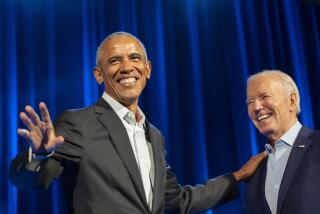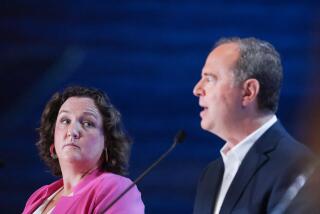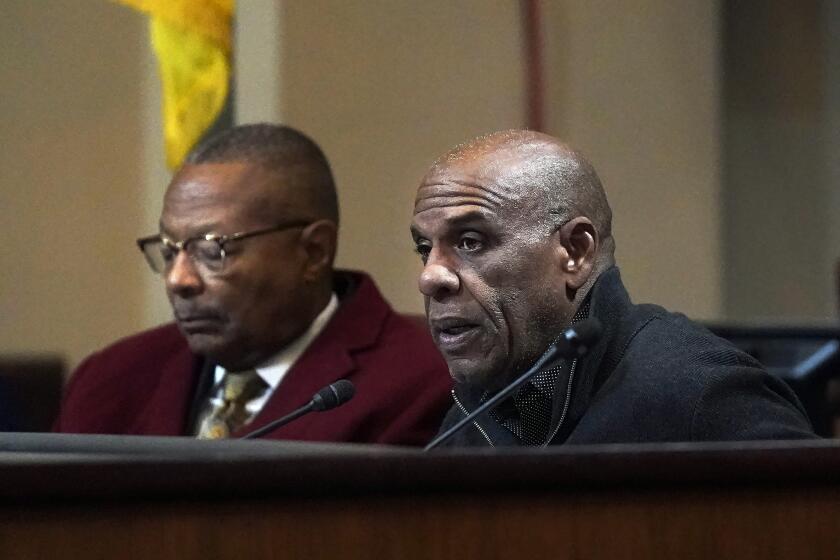Ickes Insists He Violated No Laws on Fund-Raising
Alternately defiant and contrite, President Clinton’s senior aide for his 1996 reelection campaign took responsibility Tuesday for some fund-raising missteps but insisted that he broke no laws and that Clinton’s courtship of Democratic donors was no different from the practices of his predecessors.
Harold M. Ickes, the former White House deputy chief of staff, acknowledged that he should not have sought to steer more than $1 million in donations from a Texas businessman to the Democratic National Committee and other groups in the closing days of the campaign.
But he said that his actions, which are under investigation, were not illegal because he did not solicit the money--which he was prohibited from doing as a federal employee. He said that he had erred in using a government fax machine and telephone to contact an intermediary about the donation.
In his most extensive interview on the controversy over the Democrats’ campaign, Ickes defended the party’s overall fund-raising record compared with what he described as pervasive abuses when he first got involved in politics.
“The system is a lot cleaner and a lot less subject to abuse than it was 20 years ago,” said Ickes, 57. “So I make no apologies for either the amounts of money we raised or basically the way we raised it.”
In particular, Ickes ridiculed the attention given to perquisites provided to major Democratic donors, such as invitations to White House coffees and overnight stays in the Lincoln bedroom.
His voice tinged with sarcasm, Ickes said that the media is acting as though it has made the “novel discovery” that “politicians raise money” and that “they don’t take people who have given them money out on Pennsylvania Avenue and cane them. They’re nice to them.”
“I’ll bet Lyndon Johnson never did it. Richard Nixon never did it. George Bush never did it. Ronald Reagan never did it. . . . It’s a totally new phenomenon.”
During a two-hour session, Ickes displayed both the sharp intellect and the profanity-laced intensity that have won him the respect of many partisan Democrats and the enmity of Republicans. He became one of the first of the major figures in the reelection drive to speak on the record and at length about the issues arising from the Democratic campaign.
Ickes, a New York labor lawyer and longtime Clinton friend, left the administration last week and is working as a consultant to the president to coordinate an international economic meeting scheduled for June in Denver. In addition to the fund-raising inquiry, he still faces possible recriminations from independent counsel Kenneth W. Starr’s Whitewater investigation.
As Clinton’s liaison to the reelection campaign and the DNC, Ickes oversaw the strategy and tactics of the national effort. He was legally permitted to engage in a broad range of campaign work at the White House but said that he fully complied with the prohibition against raising funds as a public employee.
Ickes conceded, however, that he “went too far” when, just days before the election, he sought to consummate what would have been a blockbuster campaign contribution.
The episode began the night of Oct. 22, when Clinton was approached by a man at a fund-raising dinner who said that a friend of his was primed to give more than $1 million to the Democrats. Soon after the dinner, Ickes recalled, the president relayed the offer to him.
“He said: ‘This guy made an offer of serious money. . . .’ I recall the president saying serious money in the neighborhood of a million bucks. And he said: ‘Will you follow up on it?’
“I should have handed this off to DNC fund-raisers.”
He didn’t.
Instead, Ickes engaged the donor’s representative, a Fort Lauderdale, Fla., export manager named R. Warren Meddoff, in a flurry of telephone conversations. Ickes once even called Meddoff from Air Force One.
On Oct. 31, Ickes faxed Meddoff a three-page memo from the White House, telling him: “If possible, it would be greatly appreciated if the following amounts [of money] can be wired to the designated banks.”
Ickes suggested that $500,000 be given to the national committee and $540,000 to three tax-exempt organizations, including $250,000 to a group called Vote Now ’96.
Ultimately, Ickes and then-Democratic Chairman Donald L. Fowler said that they decided not to accept the money. The handling of the matter is already under examination by congressional investigators and by a separate agency that enforces the Hatch Act, the law that forbids federal employees to solicit campaign funds.
Ickes said he believed he had complied with the law. White House lawyers advised him last week, he said, that they did not believe his actions amounted to soliciting the $500,000.
“It would have been the better part of discretion not to be involved,” Ickes said. But he added: “The question is, Did I solicit? There is absolutely no question in my mind, as a lawyer [that I did not]. Others can disagree.”
However, Ickes acknowledged that he personally obtained and conveyed to Meddoff the bank account numbers of the DNC and the tax-exempt groups. Ickes said he was well acquainted with two top representatives of Vote Now ’96 and referred several contributors to the group during the reelection campaign.
Ickes said that he accepts responsibility for the failure of the White House staff to properly screen those who attended 103 political coffees at the executive mansion, most of which were hosted by Clinton. Among those who attended were a Chinese arms merchant, a convicted stock swindler and other individuals with checkered pasts.
“We did not protect the White House or the presidency to the extent that we should have,” Ickes said. “This was on my watch. It was within my bailiwick. And I ain’t duckin’ it.”
Ickes, whose father served in the Cabinet of Franklin D. Roosevelt, declined to speculate whether he remains an investigative target of independent counsel Starr. Referring broadly to the repeated testimony he has given to congressional committees and to grand juries since joining the Clinton administration in 1994, Ickes said that it had worn on him.
“What they’re trying to do is mousetrap you into a perjury charge,” Ickes said. “It is very nervous-making.”
More to Read
Get the L.A. Times Politics newsletter
Deeply reported insights into legislation, politics and policy from Sacramento, Washington and beyond. In your inbox three times per week.
You may occasionally receive promotional content from the Los Angeles Times.







